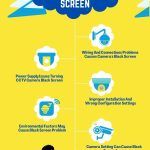Are you tired of constantly replacing your CCTV cameras due to rain damage? Well, fear not because I am here to provide you with some expert tips on how to protect CCTV camera from rain.
Rain can be a major enemy when it comes to outdoor surveillance equipment. Not only does it affect the quality of the footage, but it can also cause irreparable damage.
As someone who has been using security cameras for years, I have seen my fair share of damaged cameras and know exactly what steps must be taken to ensure they are protected.
So, let’s dive into some key strategies that will keep those cameras safe and functional even in the heaviest downpour.
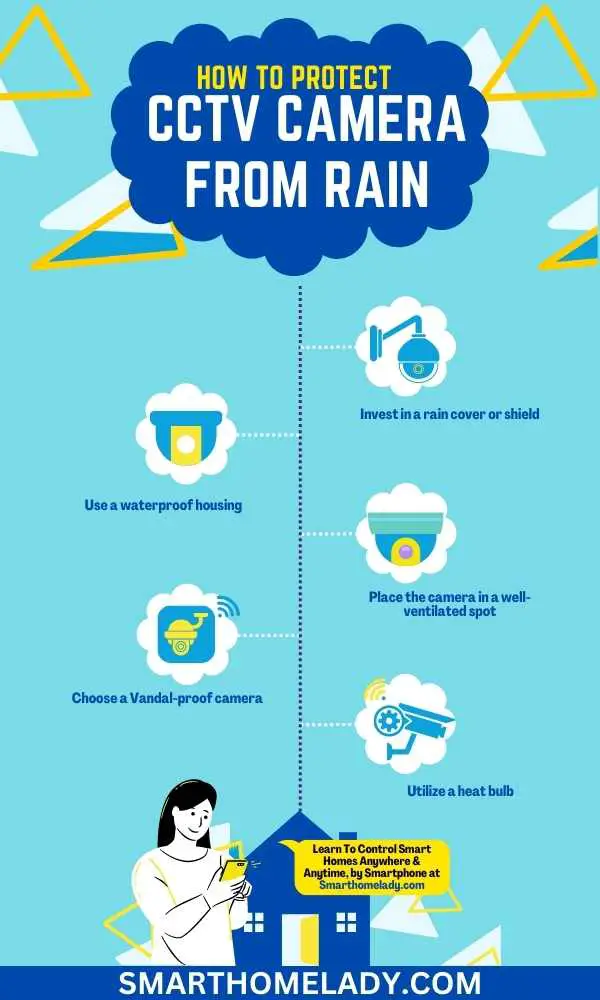
Contents
- 1 14 Ways On How To Protect CCTV Camera From Rain
- 1.1 1. Keep Your Camera Away From The Rain
- 1.2 2. Invest In A Rain Cover/Shield
- 1.3 3. Use A Waterproof Housing
- 1.4 4. Place The Camera In A Well-Ventilated Spot
- 1.5 5. Choose A Vandal-Proof Camera
- 1.6 6. Utilize A Heat Bulb To Prevent Moisture Damage
- 1.7 7. Create A Seal With Silicone
- 1.8 8. Opt For A Dome Camera
- 1.9 9. Use An Anti-Fog Spray
- 1.10 10. Prevent Water Entry With Window Sealant
- 1.11 11. Hang The Camera In A High Place
- 1.12 12. Position The Camera Strategically
- 1.13 13. Get A Floodlight
- 1.14 14. Buy A Weatherproof Security Camera
- 2 How To Prevent Security Camera Fogging And Clouding? 3 Ways
- 3 Does rain affect CCTV camera?
- 4 Can water damage CCTV camera?
- 5 Are CCTV cameras weatherproof?
- 6 How do you dry a camera after rain?
- 7 Conclusion
14 Ways On How To Protect CCTV Camera From Rain
CCTV cameras are essential for surveillance but are susceptible to damage when exposed to harsh weather conditions. Rain is one of the common elements that can damage CCTV cameras.
Here are some ways to protect CCTV cameras from rain.
1. Keep Your Camera Away From The Rain
Rain can damage your security cameras and affect their performance, leading to blurry images or complete failure.
One of the most effective ways to keep your camera safe from rain is by keeping it away from direct exposure.
Look for alternative locations that are sheltered from rainwater, such as under a roof eave or inside a protective housing unit.
If you must install outdoor cameras where there’s no cover available, consider mounting them upside down so that water cannot accumulate on top.
Suggested Readings
- How Much Power Does A CCTV Camera Use? Exact Estimate
- How To Tell If If A Security Camera Is On? 8 Ways
- Do You Need 4K TV For 4K Security Cameras?
- Can Security Cameras Record Audio?
2. Invest In A Rain Cover/Shield
Investing in a rain cover or shield is an effective way to protect your CCTV camera from the harsh elements of rain.
Rain protection alternatives include DIY rain covers made out of plastic bags, which can be a quick and easy solution but may not provide long-term effectiveness.
Investing in an effective rain shield designed for CCTV cameras is recommended for optimal protection.
Some factors to consider when choosing a rain cover or shield are its durability, compatibility with your specific camera model, and ease of installation. Maintenance is also important to ensure continued rain protection effectiveness.
Regular cleaning and inspection will help prevent water damage and prolong the lifespan of your equipment.
Here are five tips on maintaining your CCTV camera’s rain cover:
- Clean the surface regularly using a soft cloth.
- Inspect for any signs of wear or tear.
- Replace damaged parts immediately.
- Check for proper fit after installation.
- Keep away from direct sunlight as much as possible.
By following these simple steps, you can ensure that your CCTV camera remains protected against the damaging effects of heavy rainfall.
3. Use A Waterproof Housing
Another great option is to use waterproof housing. This will keep your cameras dry and shield them from other environmental factors such as dust and wind.
There are various types of waterproof housing alternatives available in the market that cater to different needs and budgets.
For example, DIY rain protection might be an ideal choice if you’re looking for a more budget-friendly solution.
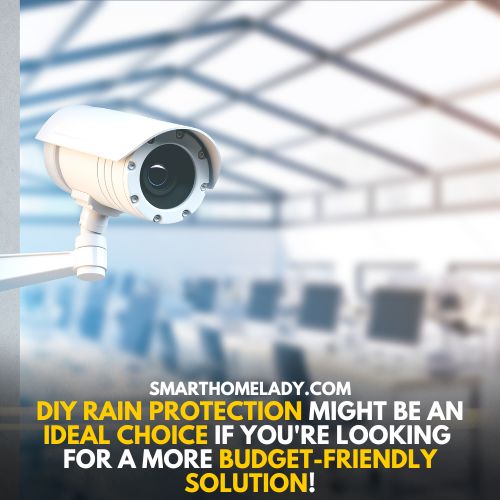
You can create your own rain shields using materials like plastic bags or transparent vinyl sheets. However, it’s important to note that these solutions may not last as long as professionally made covers.
Investing in professional-grade waterproof housings is worth considering if you’re looking for long-lasting rain covers. These are built with high-quality materials designed specifically for outdoor surveillance equipment and usually come with warranties.
4. Place The Camera In A Well-Ventilated Spot
When it comes to protecting your CCTV camera from rain, one of the most important factors is ventilation.
A well-ventilated spot for your camera can help prevent moisture buildup and reduce the risk of damage from exposure to rainwater.
In addition, proper ventilation can also help extend the lifespan of your equipment.
5. Choose A Vandal-Proof Camera
Choosing a vandal-proof camera is crucial in protecting your investment from rain damage.
Vandal-proof features are designed to withstand harsh conditions, including extreme weather and potential physical tampering.
These cameras feature impact-resistant materials that can take a beating without breaking down.
They also come equipped with durable measures such as reinforced housing and tempered glass to ensure longevity despite the elements.
In addition to their durability, these cameras boast a weather-resistant design that prevents water from seeping into sensitive components. This includes sealed connections and protective casings that keep moisture out while allowing air circulation to prevent condensation buildup.
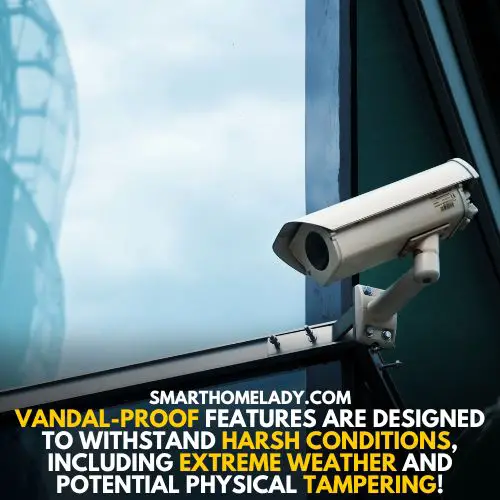
With outdoor surveillance options at an all-time high, selecting a vandal-proof camera will give you peace of mind knowing your property is well protected against any type of weather condition.
6. Utilize A Heat Bulb To Prevent Moisture Damage
Moisture damage can cause serious problems for your surveillance equipment, leading to costly repairs and even downtime.
Another effective solution is to utilize a heat bulb application that can prevent moisture damage by creating an optimal temperature inside the camera housing.
This technique works particularly well in areas with high humidity or frequent rainfall.
By providing a consistent source of warmth, you’ll reduce condensation accumulating on sensitive parts such as lenses and circuit boards.
7. Create A Seal With Silicone
The creation of a seal with silicone can also be used to protect cameras from rain. When it comes to waterproofing basics, you want to ensure that all potential water entry points are sealed tight.
This includes gaps between the camera housing and mounting brackets or cables entering the back of the camera.
Applying silicone around these areas will prevent moisture from seeping in and causing damage.
As for which brand of sealant to use, there are many options on the market, but some trusted names include GE Silicone II and DAP 100% Silicone Sealant.
Suggested Readings
- Do You Need A License To Install Security Camera?
- Is It Illegal To Tamper With Security Cameras?
- Can We Use CCTV Camera Without DVR?
- Can I Use Xfinity Security Camera Without Service?
8. Opt For A Dome Camera
Dome cameras offer greater protection against weather conditions due to their shape and housing design. On the other hand, bullet cameras have longer ranges and can provide better image quality.
Dome cameras have a protective cover that shields the camera lens from rain, snow, and other weather elements.
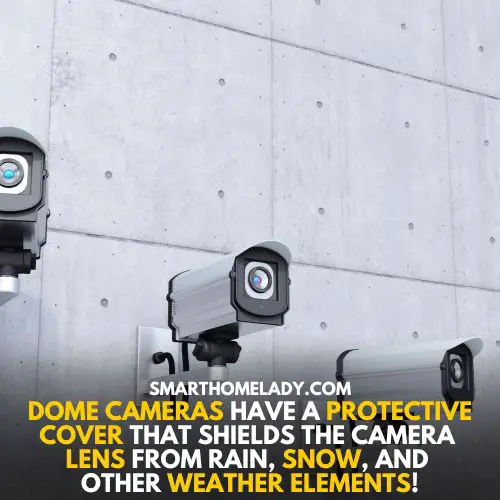
Additionally, some dome cameras have a built-in heater that ensures the lens stays clear from fog and condensation in humid conditions.
Therefore, if you are looking for a security camera to install outdoors, a dome camera is an ideal choice, as it can withstand outdoor weather conditions and continue to provide clear surveillance footage.
9. Use An Anti-Fog Spray
Moisture is often the culprit when it comes to reduced clarity and malfunctioning equipment. Consider using anti-fog solutions to prevent condensation from forming on your camera lens.
Anti-fog sprays are a simple yet effective way to maintain clear vision in any weather condition. These products work by creating an invisible barrier that prevents moisture from settling on the surface of your camera lens.
They’re easy to apply and affordable, making them an ideal solution for homeowners and business owners alike.
10. Prevent Water Entry With Window Sealant
Another alternative is using window sealant around the edges of your camera lenses. This will prevent water from seeping into the lens and causing permanent damage.
However, it’s important to note that not all window sealants are created equal – some may damage the plastic on your camera housing or cause fogging inside the casing over time.
11. Hang The Camera In A High Place
You can also protect your CCTV camera by elevating its installation. Hanging a camera in a high place can protect it from rain if the camera is placed under a shelter or canopy.
The higher the camera, the less likely it is to get wet by raindrops falling directly on it.
Additionally, if the camera is mounted on a wall or pole, it can be angled downwards to prevent rain from directly hitting the lens.
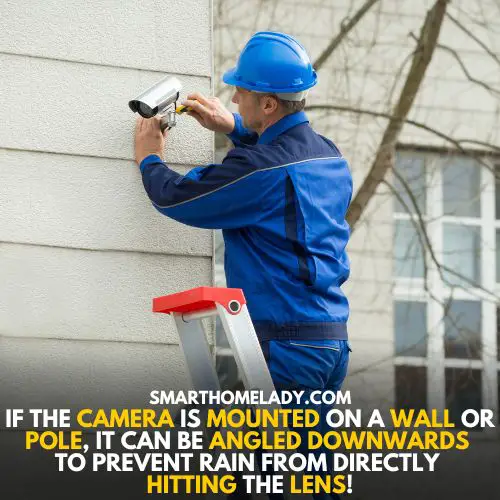
However, it’s important to note that hanging the camera in a high place doesn’t necessarily guarantee protection from rain in all situations.
Suggested Readings
- Do Home Security Cameras Use A lot Of Electricity?
- Security Cameras That Work When Power Goes Out
- Can Security Cameras See In The Dark?
- Can Security Cameras Be Jammed?
12. Position The Camera Strategically
Positioning your camera under an eave or awning strategically is a way to protect your camera from rain. It will shield it from precipitation.
When choosing camera placement for outdoor surveillance, always prioritize areas with minimal water damage risk.
KEEP IN MIND: Even with strategic positioning and proper weather protection, no camera is completely immune to the effects of extreme climate conditions.
Investing in a weatherproof security camera may be best for added peace of mind if you live in an area with particularly heavy rainfall or inclement weather patterns.
13. Get A Floodlight
Floodlights are an excellent addition to any CCTV camera system. They provide not only additional lighting for the area but also act as a deterrent against potential intruders.
A floodlight can help protect your cameras from rain by illuminating the area and providing better visibility during inclement weather conditions.
Many floodlights have waterproofing features that protect the camera from rain and other harsh weather conditions. This can help prevent damage to the camera and ensure it continues functioning properly.
14. Buy A Weatherproof Security Camera
A weatherproof camera is designed specifically to withstand harsh and unpredictable weather conditions while providing reliable surveillance of your property.
With its waterproof security features and sturdy design, this equipment ensures that your CCTV system remains operational even during heavy rainfall or snowfall.
As an expert user of CCTV cameras, I highly recommend investing in a weatherproof camera for outdoor surveillance purposes.
It provides superior performance compared to non-weather-resistant equipment and ensures uninterrupted monitoring of your property regardless of the climate.
How To Prevent Security Camera Fogging And Clouding? 3 Ways
Security camera fogging and clouding can be a common issue, especially in areas with high humidity or temperature changes. This can lead to blurry or distorted footage, making it difficult to identify potential threats.
However, there are several ways to prevent this from happening. I recommend using anti-fog film on your security cameras to help prevent fogging and clouding from rain.
1. Anti-Fog Film
Anti-fogging solutions are necessary for security cameras in humid or outdoor environments. They are available as sprays, wipes, or gels, creating a hydrophobic layer on the lens that prevents water droplet formation.
The solutions reduce surface tension and prevent dirt and dust accumulation. They are easy to apply and long-lasting, providing protection for several months.
When it comes to anti-fog film effectiveness, it’s important to choose a high-quality brand with good reviews.
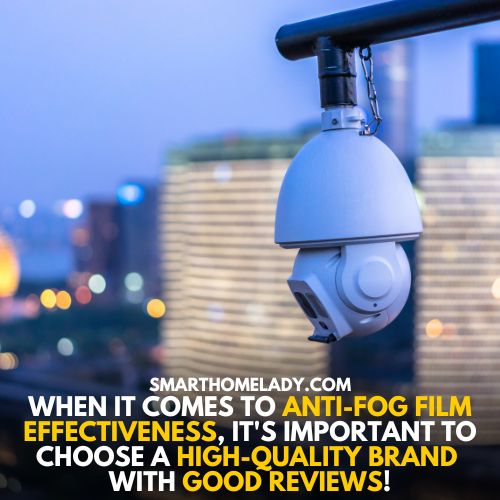
Finally, durability and removal are key factors when considering anti-fog film options. Choosing a product that won’t easily peel off or become damaged over time is important.
With careful consideration of effectiveness, application process, durability, and removal methods, you can protect your investment without sacrificing quality or convenience.
2. Waterproof Coating
While the anti-fog film has gained popularity in recent years as a solution, there are also waterproof coating alternatives worth considering.
One of the benefits of using waterproof coatings is their longevity. Unlike some anti-fog films that may peel off or become damaged over time, high-quality waterproof coatings can last years with proper application and maintenance.
Additionally, waterproof coatings can be more cost-effective than anti-fog film options, especially when covering multiple cameras.
When applying a waterproof coating to protect your CCTV cameras from rain and moisture, following the manufacturer’s instructions carefully is important.
Some tips include properly cleaning the lens before application and allowing enough drying time between coats.
Suggested Readings
- How To Know If A CCTV Camera Is Recording?
- What Happens If You Unplug A Security Camera?
- What Upload Speed Do I Need For Security Cameras?
- How Much Storage Do I Need For Security Cameras?
- How Long Does A CCTV Footage Last?
3. Use Anti-Condensation Measures
To further protect your CCTV camera from the elements, it is important to implement anti-condensation measures.
- Moisture prevention should be a top priority when considering how to keep your camera dry and functional during rainy weather conditions.
- Temperature control is one of the most effective ways to prevent moisture buildup inside your camera.
- Humidity regulation is another key aspect of protecting your CCTV camera from rain.
High humidity levels can lead to condensation forming on the interior surfaces of your device, which can damage sensitive components over time.
Anti-mist measures such as using silica gel packets or installing a dehumidifier in the area where your camera is located can help reduce humidity levels and prevent fogging.
Condensation avoidance techniques are also crucial for maintaining the optimal functionality of your CCTV camera.
To avoid condensation from building up on lenses or other parts of the device, ensure that any protective covers or housings are properly sealed and ventilated.
By implementing these anti-condensation measures, you can effectively protect your CCTV camera from rain and ensure its longevity and reliability over time without worrying about costly repairs or replacements.
Frequently Asked Questions FAQs
Does rain affect CCTV camera?
Yes, rain can affect CCTV cameras if they are not properly protected. Water droplets can accumulate on the lens, obstructing the view or causing blurry images.
Additionally, heavy rain can damage the camera’s electrical components, leading to a malfunction or complete failure.
Can water damage CCTV camera?
Yes, water can damage CCTV cameras if they are not designed to be weatherproof.
Water can seep into the camera’s housing and cause electrical shorts or corrosion, leading to a malfunction or permanent damage.
Are CCTV cameras weatherproof?
Not all CCTV cameras are weatherproof, but many are designed to withstand various weather conditions.
Weatherproof cameras are typically rated based on their ability to resist water and dust and can be used in outdoor environments without damage.
How do you dry a camera after rain?
To dry a camera after rain, remove any excess water with a dry cloth. Then, gently dry any remaining moisture using a hairdryer on a low heat setting.
It’s important to avoid using high heat or exposing the camera to direct sunlight, as this can cause further damage.
Alternatively, you can leave the camera in a dry, well-ventilated area for several hours to allow it to air dry naturally.
Conclusion
As a smart home lady, it’s my passion to ensure that your security cameras are always in tip-top shape. Rain is one of the biggest threats to the longevity of your equipment, and I have here informed you how to keep them safe.
Imagine your camera as a soldier standing guard against all odds. It needs proper gear to protect itself from getting drenched in rainwater or damaged by moisture build-up.
By investing in quality rain covers, waterproof housings, and anti-condensation measures, you’re giving your loyal sentinel the armor it deserves.
Don’t let heavy rains sabotage its mission; give it the tools to withstand any weather condition thrown its way.
Trust me; with these tips, your cameras will be ready for whatever comes their way.


